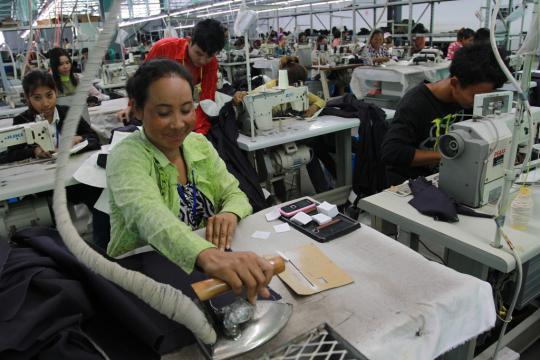
In my previous blog posts on Global Vale Chains (GVCs), I discussed the important role of lead suppliers in linking up with small and medium-size enterprises (SMEs). Since IFC is planning to work with anchor companies to influence supplier-SME relationships, I’m now looking into what type of anchor leads we should work with: those anchors whose business model is built around a Western-style, arm’s-length relationship, or those whose model and business style is based on joint trust, cooperation and support for their suppliers – using a type of keiretsu model (which seeks to enrich a relationship for mutual long-term benefits).
In other words: Should we work with those anchors that only check the inspection documents of suppliers’ factories, or with those who also examine the physical workplace and social well-being of their employees?
To achieve long-term socioeconomic benefits for all – especially to unemployed, unskilled and untrained workers – working with lead firms who embrace key elements of the keiretsu model simply makes sense in our development context. Such a model provides a much-needed upgrading for suppliers who hire such workers, offering clear benefit to them and their products by positioning them in a more relevant role in the GVC.
Anchor firms that rely on such a close working relationship could offer SMEs the support they need to improve operations; could send technical teams to work side-to-side with them to improve efficiency and quality; and could enhance the employability of their workers. I believe in this model, and in its premise of building long-term partnerships based on mutual advantage to all players in the chain. Amid the economic changes since the global economic crisis, and amid the current discussion about “creating shared value,” many anchor companies are repositioning their role in GVCs. The World Bank Group could help them move further toward this model.
One possibility for the Bank Group is to work directly with anchor leads who embrace this model to leverage their influence over suppliers. Another possibility is to work directly with suppliers who embrace this model to help them have a foothold in GVCs by better positioning them and making them more appealing to anchor firms.
Consider, for example, the apparel brand Boxercraft, which decided to use, as its supplier, a Haitian garment manufacturer called Industrial Revolution II (IRII). Part of the appeal of IRII is that it offers training to unemployed Haitian, pays them more than the minimum wage, and donates half of its profit to social program. IRII is not just a typical subcontractor: It offers technology transfer, knowledge and training – and it thus helps the Haitian apparel industry move up the value curve up by drawing high-margin apparel work to the country. IRII just started production recently in a facility in Port-au-Prince, focusing on landing orders from upscale Western clothing brands – the sort that usually go to Milan or NY. The fact that IRII is backed by celebrities, including designer Donna Karan and actor Matt Damon, has added to its prominence.
IRII’s experience and approach are inspiring. IFC can help support such interventions, which are at the heart of what we’re trying to achieve as a development institution. IRII co-founder Rob Broggi says this venture was born out of frustration with the outright failure of global relief efforts after the 2010 earthquake: “People do not want handouts,” he recently told journalists. “They want economic opportunity and good jobs.” IRII’s model has the potential to spark an industry-wide revolution that can help those who are at the heart of the World Bank Group’s reform programs.
We have a role to play and a position to take in terms of what type of lead firms we should work with, and what approach they should take. We are there for the long-term benefit of the poor, and we should work with partners who share the same values. We can work with firms like Boxercraft, who can influence their suppliers to provide training and skills upgrading, or we can work directly with firms like IRII to build their capacity to meet the needs of anchor firms.
The World Bank Group has a stature greater than that of celebrities, and we can definitely ignite the spark of far-sighted improvements for SMEs in global value chains.


Join the Conversation